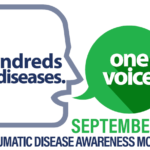
Many of us have experienced that look—confusion—when you tell someone that you work in rheumatology. It happens at dinner parties, in line at the grocery store, and during conversations on airplanes. The look can open the door to conversations about rheumatology. However, when the influential people whose decisions affect our specialty don’t know who we are and don’t value our contributions to healthcare, that look has serious consequences.
Earlier this year, the ACR asked you to tell us about your perceptions of the awareness of rheumatology, audiences who need to hear messages about rheumatology, what those messages should be, and how—if at all—supportive you would be of a public relations (PR) campaign. The results of this research—with 90% of survey respondents agreeing that there is a need for increased awareness of rheumatology—showed that we need to increase public awareness of our specialty, and our members are ready for it. Additionally, ACR leadership felt that, with healthcare reform and the emphasis on primary care, subspecialties like ours would be at risk of not being properly valued in the future healthcare system. The ACR board felt it was necessary that we commit our resources to ensure that this does not occur. We felt it important that policy makers have a better understanding of the role we play in providing cost effective care for patients with chronic musculoskeletal diseases.
It is with that knowledge that the ACR took the next step in reaching those groups that influence rheumatology, and I am pleased to announce the ACR’s first public relations campaign: Influencing the Influencers.
Reaching Influencers
Influencers make decisions that affect our profession both positively and negatively. The decision to pass or kill legislation, the decision to refer a patient with inflammatory arthritis, the decision to consider rheumatology when changing reimbursement rates—all of these decisions are made by influencers.
For rheumatology, our influencer audiences are national legislators and policymakers, administration officials, advocacy leaders, and physician groups. Through the work of this campaign—which includes partnering with other existing, internal efforts in the areas of government affairs and practice advocacy—we aim to elevate the importance of rheumatology, increase understanding of the work of rheumatologists and rheumatology health professionals, and lay a foundation of awareness and understanding that creates support for more favorable public policy. If we don’t communicate with these groups, they are not likely to consider rheumatology when making decisions.
This campaign has a number of tactics to reach each influencer group. We plan to use traditional media to reach influencers through media outlets they turn to for information (e.g., The Hill, Roll Call, The New York Times, The Washington Post). We also plan to use digital and social media to reach influencers through Facebook, Twitter, YouTube, and prominent blogs. Additionally, we will employ relationship-building tactics that will allow us to educate and work with influencers on our issues (e.g., speaking at conferences, holding face-to-face meetings with stakeholder groups, etc.). These are but a few of the many tactics the campaign will employ.
Healthcare … is changing, and we must ensure that rheumatology is well positioned in whatever healthcare delivery system evolves from this debate.
Keeping Members Informed
Just as the ACR is your professional association, this is your profession’s PR campaign. You will hear more about the campaign in Daily News at this year’s annual meeting, in The Rheumatologist, and through Rheumatology Morning Wire. We will also use our social media channels (Twitter, Facebook, YouTube, etc.) to keep you informed on campaign milestones. Finally, because your participation and full understanding of the campaign will be essential to its success, the ACR will arm you with the information you need to share campaign messages with your patients, colleagues, and lawmakers. One central place to obtain this information will be through a members-only page on the ACR website, and we plan to work on adding that material in early 2011.
The First Step of This Journey
As the saying goes, every journey starts with a single step. Great strides can be made by starting where our members feel we currently need the strongest and most immediate impact. While there is no silver bullet to fix every single problem we face as rheumatologists and rheumatology health professionals, we can make an impact on some issues now while laying a firm foundation that will support our work towards affecting other areas in the future.
